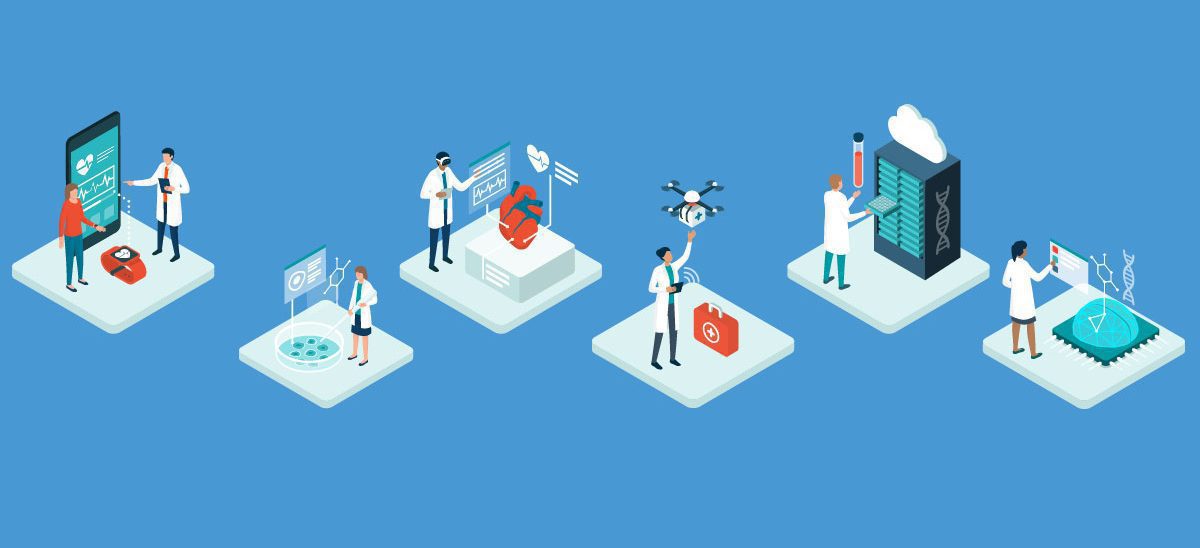How AI Can assist sustainability in the healthcare industry

In a survey of business executives across the healthcare industry, over 50 per cent of respondents believed that AI will be ubiquitous in healthcare by 2025. Following the recent drive in AI technologies, Jermyn Street Design takes a closer look at the ways in which AI can ensure sustainability in the healthcare industry.
How AI Can Assist Sustainability in the Healthcare Industry
The advantages of AI are clear: speeding up processes, recognising more intricate patterns, and dealing with large amounts of data and information. While humans can do this work manually, AI is quickly eating into the monopoly, becoming useful across many sectors, including the healthcare industry.
In a survey of business executives across the healthcare industry, over 50 per cent of respondents believed that AI would be ubiquitous in healthcare by 2025.
The need for AI in healthcare is clear. Healthcare relies on accuracy and intelligence, with complex medicines and quality care needed to treat patients. In this sense, AI is helping to improve the healthcare industry across the board. However, can these automated services also assist pharmaceutical businesses and healthcare providers to be more sustainable? Here we explore how AI is working within the healthcare industry and how it is helping the environment through reduced waste and energy use.

Precision pharmaceuticals
In pharmaceutical manufacturing, efficiency and precision will factor into drug development and creation time. From prioritising medicines to organising stock, AI is helping to make processes more precise, saving time, money, and energy.
AI is able to automate processes, understanding large amounts of patient and health data. This means that drugs can be automatically ordered and prioritised based on urgency while sharing complex details on precise treatment needs. Robotics and other automated technology may even be able to procure elements of treatment for pharmacists.
In terms of sustainability, the saving can be seen in energy and time. As opposed to human labour, the lower energy consumption of AI services is also good news for the environment. Lower energy use links directly to a lower environmental impact from electricity generation.
This automation can also help pharmaceutical businesses to be more hygienic. Alongside quality workwear clothing for healthcare workers, sanitary PPE, and limiting human contact, AI can automate processes that may have required human labour. These automated processes reduce human action and the waste involved with ensuring environments are clean for healthcare standards.
Drug development
For drug development, large data sets and clinical trials are used. Patterns must be recognised among this data and research to show symptoms, cures, side effects, and various other impactful features of drug development.
AI is useful because its intelligence can quickly point out these patterns and may indicate further assertions that human analysis may have missed. As a result, AI is slashing the time it would traditionally take to develop a new drug. In 2018, one pharmaceutical company used AI to help identify new treatments for type-2 diabetes. Understanding data and patterns are key to these processes, with technology only aiding the endeavour.
AI helps the environment not only by saving time and energy but through minimisation of work. More intelligent AI systems will be able to understand the compatibility of drugs, the biology of disease, and the effects of medicinal components to automatically create new medicine. In turn, this reduces the amount of waste during experimental processes of drug development. If the AI system can identify failures early on, pharmaceutical waste can be avoided. This prevents material, plastic, and other by-product waste from going to landfill.
Treatment efficiency
With digitised personal health records becoming more prominent in our lives, AI is helping to make our healthcare more efficient. By automating our GP records, appointments, treatments, and recording historic immunisations, AI can identify our needs better than ever before.
Suppose a patient is due for further immunisation or medicine. In that case, AI systems will be able to identify when these are needed, should a patient or medical professional fail to do so. Further to this, by comparing your historic health record, AI systems may be able to identify which illnesses you may be prone to. Our biology, genealogy, and past illnesses may make us more likely to have diabetes, cancer, or heart disease, for example. AI systems may recognise factors in your health history that could lead to these, predict illnesses before they occur, and recommend measures to treat or avoid them.
In terms of sustainability, of course, our health is closely linked to the environment. If AI can encourage us to live healthier lifestyles and can prevent illness, our energy and waste use will be reduced. As a result, medicine is not wasted, health workers labour is reduced, and we live better lives. This, in turn, encourages sustainability within the health care system.
AI will continue to develop and improve, and it will continue to grow its utility within the healthcare industry. As businesses and services providers turn their attention to their environmental obligations, there is no doubt that AI will play an integral role in ensuring that the healthcare industry is more sustainable.
For more news from Top Business Tech, don’t forget to subscribe to our daily bulletin!